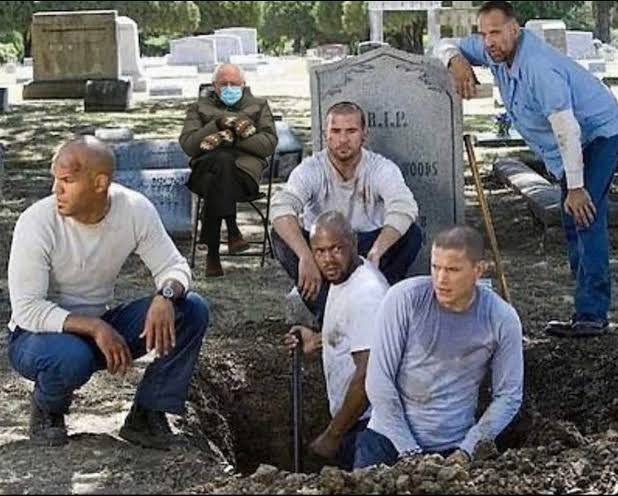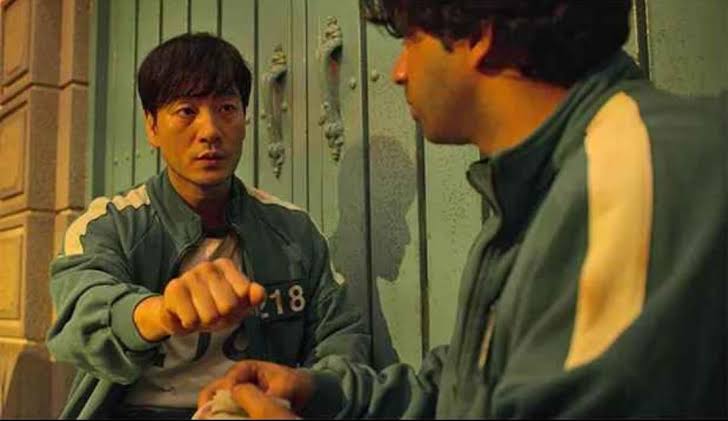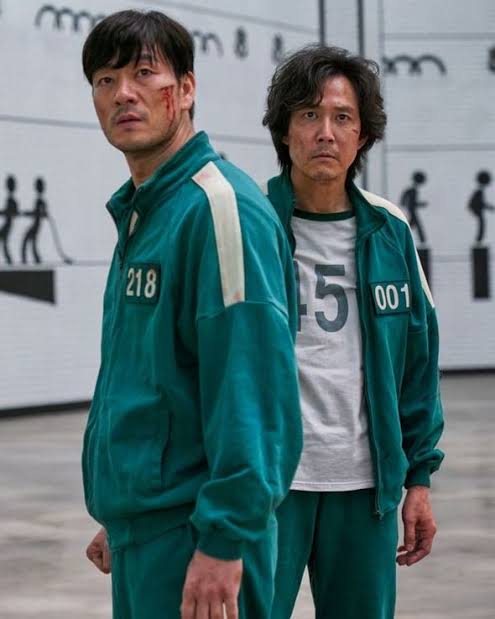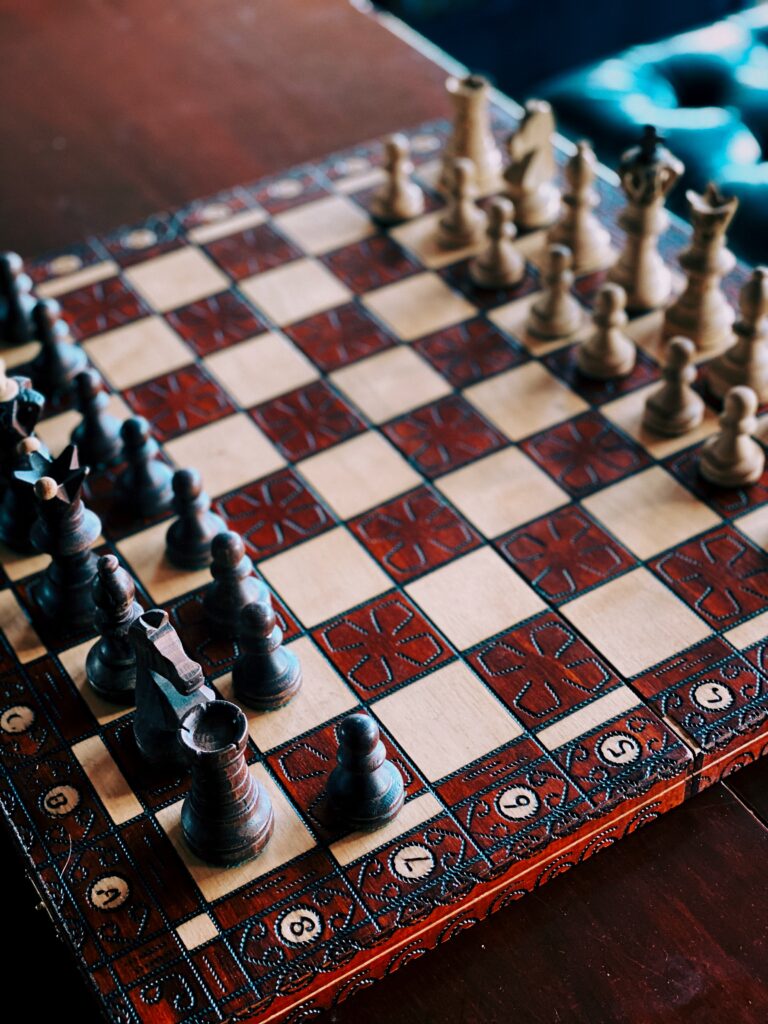
Life is not fair. It never was, and it never will be. Squid Game strips away the illusions of fairness and exposes the raw reality of survival in a ruthless world. The show isn’t just about a deadly competition—it’s a mirror reflecting the struggles of everyday life, where only the strong, strategic, and adaptable thrive.
Through blood-soaked betrayals, desperate alliances, and the merciless laws of power, Squid Game teaches us lessons that apply far beyond the arena. Here are 10 brutal truths about life we can learn from it.
- Life in Itself Is a Game of Survival
From the moment you’re born, you’re thrown into a brutal competition. You didn’t sign up for it, yet here you are, just like the contestants in Squid Game.
Some people are born rich, others poor. Some get a head start, others are playing on “hard mode” from day one. But in the end, one rule applies to all—survive or be eliminated.
Take the first game, Red Light, Green Light. The rules are simple—stop when the creepy doll turns around, run when she looks away. But what happens? Panic. Chaos.
People trample each other, scream, and beg for help as they get shot one by one. That’s real life for you.
School, work, dating—everyone is pretending to follow the rules, but the moment they see an opportunity to move ahead, they’ll trample you if they have to.
Look at Ali, the kind-hearted Pakistani worker. Strong, loyal, hardworking. And what does he get? Betrayed and robbed by Sang-woo, the slick, educated businessman who plays dirty to win. That’s corporate life right there.
You work your ass off, stay loyal to the company, and then—boom!—your boss pulls a Sang-woo, takes credit for your work, and fires you like yesterday’s trash.
And then there’s Gi-hun, the guy who survives mostly on luck.
He’s like that dude you went to school with who barely studied, copied everyone’s homework, and still ended up successful while you, who followed all the rules, are still struggling.
Some people are just born lucky. But as the game shows, luck runs out. Even Gi-hun learns that survival isn’t just about chance
—it’s about adapting, being ruthless when needed, and knowing when to trust and when to betray.

In the end, Squid Game teaches us that life is nothing but a giant survival competition. The rich control the game, the poor fight for scraps, and only those who understand the rules make it to the top.
The real question is: are you a player or just another pawn waiting to be eliminated?
- You Must Continue Playing the Game Until You Win or Get Eliminated
There are only two options in life: keep playing or die trying. In Squid Game, there’s no quitting halfway.
Once you step into the arena, you either win the money or get your brains blown out.
Real life isn’t much different—except instead of masked guards with guns, you have rent, bills, and responsibilities waiting to eliminate you if you fail.
Remember when the contestants got a chance to leave after the first game? They voted, packed their bags, and returned to their miserable lives.
But reality hit them harder than a Squid Game slap. Debts. Poverty. Betrayal. They realized something important: they were already playing a game of survival—just without the cash prize at the end.
So, what did they do? They willingly walked back into the slaughterhouse.
This is how real life works. You may think you can “opt out” of the competition, live a simple life, and avoid the hustle.
But the game doesn’t stop just because you refuse to play. The world keeps moving, and if you stand still, you get left behind.
Look at Sang-woo, the financial genius who was once a big-shot businessman. He tried to cheat the system, but when his lies caught up with him, he had two choices: keep playing or get arrested.
So, he played—and played dirty. That’s corporate survival for you. If you’re not climbing, you’re falling. If you’re not making moves, someone else is making them against you.
Even Gi-hun, who tried to be “nice” and avoid the ruthless side of the game, had to accept reality: only those willing to do whatever it takes can win.

Whether it was choosing to betray, making tough calls, or swallowing his guilt, he had to adapt—or die.
Life is just like Squid Game. There’s no quitting. No safe zone. No timeouts. You either play until you win, or you play until you’re eliminated. And the worst part? The game doesn’t care about your excuses.
- Life Is Full of Zero-Sum Games
A zero-sum game means that for one person to win, another must lose. In Squid Game, this is as clear as day—every victory comes at the direct expense of another player’s elimination.
But guess what? Real life works the same way.
Take the infamous Marbles game. Before that round, everyone had paired up thinking they’d compete together.
Some chose their best friends, others their most trusted allies. But when the rules were revealed—only one of them could survive—you could hear hearts shattering.
Husbands and wives, best friends, lifelong comrades—suddenly, it was a matter of “you or me.”
That’s how life is. Not everyone can win. If one person gets the promotion, someone else gets rejected. If one businessman lands a million-dollar deal, his competitor just lost out.

If one politician wins, his opponent’s career is dead. For someone to rise, another must fall.
Look at Sang-woo and Ali. Ali thought they were in it together, like brothers. But Sang-woo knew the truth—there was no room for both of them.
So he did what cold, calculating winners do: he played smart, tricked Ali, and walked away while Ali got eliminated. Harsh? Yes. But effective.
And let’s not pretend this doesn’t happen in real life. Every industry is a battlefield. If your business succeeds, it’s because you outplayed competitors.
If you land a dream girl, some other guy just lost his chance. Even nature plays by these rules—stronger animals survive by outcompeting the weak for food, territory, and mates.
The world is not a charity. It’s a game of winners and losers. If you’re not willing to compete, someone else will take what could have been yours.
Either you’re playing to win, or you’re just another stepping stone for those who are.
- Being Nice to Others Is Not Often Good—You Are on Your Own
Society tells you to be kind, to help others, to always play fair. But Squid Game shows the brutal truth: kindness doesn’t guarantee survival—and in many cases, it gets you eliminated.
Look at Ali. Pure-hearted, loyal, always willing to help. He literally saved Gi-hun in Red Light, Green Light by catching him mid-fall. Did his kindness pay off? No.
When it came down to survival, Sang-woo tricked him, stole his marbles, and left him to die like a fool. That’s what happens when you trust too much in a world that rewards ruthlessness.

And what about Gi-hun’s old man friend, Il-nam? Gi-hun treated him like a father, even trying to protect him in Marbles.
But the moment the old man revealed his true nature, Gi-hun realized he had been playing himself the entire time.
Il-nam was never in danger—he was controlling the game. Gi-hun’s kindness had made him blind to the real power dynamics.
Real life is the same. Being nice doesn’t mean people will be nice to you. At work, if you’re always helping others and expecting favors in return, you’ll just get used and discarded when you’re no longer useful.
In relationships, if you’re always giving without boundaries, people will take advantage of you. The world respects power, not kindness.
This doesn’t mean you have to be evil. It just means you should stop expecting others to care about your well-being more than their own.
Everyone is looking out for themselves first. You either play smart, set boundaries, and protect yourself, or you get played.
At the end of the day, you are on your own. And if you forget that, you’ll end up just like Ali—betrayed, defeated, and wondering why your goodness wasn’t enough to save you.
- The Majority of Humanity Are Losers
If Squid Game proved one thing, it’s that most people are destined to lose—not because they are unlucky, but because they make weak, emotional, and self-destructive choices.
Look at the contestants. Over 400 people joined, yet only one could win. But here’s the kicker: most of them eliminated themselves before even getting close to victory.
They panicked. They hesitated. They trusted the wrong people. They played with emotions instead of strategy.
The reality is, the majority of people are not built to win. They are easily manipulated, easily controlled, and easily destroyed.
Take Tug of War, for example. The losing team didn’t lose because of bad luck. They lost because they lacked strategy, leadership, and mental toughness.

Meanwhile, Il-nam, the old man, knew something they didn’t—winning is about brains, not just brute force. His team used psychology and tactics, and they won against stronger opponents.
That’s life. The weak complain, but the strong adapt and find a way to win.
And let’s not forget the desperate gamblers who chose to come back to the game, knowing full well that most of them would die.
Why? Because they lacked discipline, self-control, and long-term thinking.
They had already lost in life, and instead of fixing themselves, they threw themselves into another losing battle, hoping for a miracle.
This is exactly how the real world works. Most people make bad financial choices, chase get-rich-quick schemes, stay in toxic relationships, and repeat the same mistakes over and over.
They are controlled by their emotions, unable to think long-term, and always looking for someone else to blame.
The lesson? Most of humanity are losers—not because the system is unfair, but because they refuse to think, strategize, and play the game properly.
If you don’t want to be one of them, stop thinking like them. Winners play smart. Losers make excuses.
- Sometimes You Win Because You Are Just Lucky
No one wants to admit it, but luck plays a massive role in success. Squid Game makes this painfully obvious—sometimes, survival isn’t about skill, intelligence, or strength.
Sometimes, you just get lucky.
Take Glass Bridge, for example. That game was pure luck roulette. It didn’t matter how strong, smart, or rich you were—if you stepped on the wrong glass, you were gone.
The ones at the front were doomed unless they guessed right. The ones in the middle had slightly better odds. And the ones at the back?
They had the best chance, simply because they got to watch others die first. Gi-hun, the eventual winner, only survived because he was lucky enough to go last.
Or look at Red Light, Green Light. Most people died not because they were weak, but because they panicked at the wrong time. Gi-hun?
He tripped, was about to die, and only survived because Ali caught him. If Ali had been a second slower, Gi-hun would’ve been eliminated in the first game.

Now, does this mean winners don’t deserve their victories? No.
But it does mean that no one succeeds purely by their own efforts. Right timing, right place, right circumstances—it all matters.
Real life is no different. Some people are born into wealth, while others start with nothing.
Some stumble into the right opportunities, while others never get a lucky break.
Hard work and strategy matter, but sometimes, winning is simply about being in the right place at the right time.
The key lesson? You can’t control luck, but you can put yourself in positions where luck is more likely to work in your favor.
Stay in the game long enough, and eventually, you might catch the right break—just like Gi-hun did.
- A Weak Team with a Brilliant Strategy Can Beat a Stronger Opponent Who Lacks a Winning Strategy
Raw power means nothing without a solid plan. Squid Game proved this when Il-nam’s team, full of misfits—
including a frail old man, a broke gambler, a woman no one wanted, and a scrawny immigrant—defeated a physically superior team in Tug of War.
On paper, they were doomed. The other team was stacked with muscular men who looked like they spent their lives bench-pressing debt collectors.

But Il-nam, the old man, had experience, knowledge, and most importantly—a strategy. He didn’t panic.
He didn’t rely on brute force. Instead, he used teamwork, timing, and tactics to completely outmaneuver their opponents.
His plan?
Positioning: Placing the strongest person at the back to act as an anchor.
Technique: Keeping their bodies low to the ground to maximize stability.
Psychology: Letting the other team tire themselves out before making their move.
And guess what? It worked. The stronger team, despite having a physical advantage, collapsed like a poorly built Jenga tower.
Now, apply this to real life.
In business, a small but strategic company can outcompete a giant corporation stuck in old ways.
In sports, a well-coached underdog team can take down a sloppy team of superstars.
In war, history is full of smaller armies defeating larger ones through superior tactics.
The lesson? If you lack strength, outthink your opponent. The dumb brute may be stronger, but if he doesn’t have a plan, he’ll eventually fall to someone who does.
- Trust Anyone 100% at Your Own Risk
If Squid Game had a slogan, it would be: “Trust kills faster than bullets.” The show repeatedly teaches us that blind trust is a death sentence—and yet, people keep making the same mistake.
Take Ali. Pure-hearted, loyal, always putting others first. He literally saved Gi-hun’s life in Red Light, Green Light.
But what did that get him? Sang-woo, his “brother,” tricked him, stole his marbles, and left him to die.

Or what about Sae-byeok? She made the mistake of letting her guard down, trusting Gi-hun and the others to keep her safe after the glass bridge game.
What happened? Sang-woo slit her throat while she was vulnerable.
Even Gi-hun, the final winner, trusted the old man, Il-nam, only to find out he was the mastermind behind the entire game.
Il-nam had been playing him the whole time, laughing at his kindness while secretly pulling the strings.
Real life isn’t much different.
Trust your employer to take care of you? They’ll replace you the moment it benefits them.
Trust politicians to fix your problems? They’ll sell you dreams, then do what benefits them.
Trust someone with your deepest secrets? You just handed them a loaded gun to use against you.
This doesn’t mean you should be paranoid and distrust everyone. But it does mean you should never trust anyone 100% without a backup plan.
Always leave room for betrayal. Always have an escape route. And most importantly—never put your survival in someone else’s hands.
- After Winning, Enjoy Your Wealth in Private—You Cannot Beat the System
At the end of Squid Game, Gi-hun had won. 456 billion won. More money than he could have ever imagined.

He had suffered, outlasted, and survived. But did he go off to enjoy his riches in peace? No. Instead, he wasted time trying to fight the system—and it destroyed him.
Instead of moving on, he got obsessed with exposing the game’s creators. Did it change anything? Nope.
The game continued. The rich still controlled everything. Gi-hun didn’t change the system—he only made himself miserable.
This is the reality of life. There are forces bigger than you. The world is controlled by elites who don’t play by the same rules as everyone else.
Governments, corporations, secret networks of the ultra-rich—they built the system, and they know how to protect it.
Look at history.
JFK tried to challenge the system. He got assassinated.
Gaddafi tried to challenge the global financial order. He got eliminated.
Big whistleblowers? They either disappear or spend their lives running.
Meanwhile, the billionaires and power players stay silent, move in the shadows, and enjoy their wealth privately.
The smart move? If you win, take your money and disappear.
Enjoy your success without drawing attention.
Don’t make enemies out of powerful people.
Don’t waste energy trying to “fix” a system that has been rigged for centuries.
The game is not fair. It never was. But if you win, don’t be a fool like Gi-hun. Cash out, keep a low profile, and live the life others can only dream of—quietly.
- Debt Is Worse Than Hell
If Squid Game had a true villain, it wasn’t the masked guards, the VIPs, or even Il-nam. It was debt.
Every single contestant in the game wasn’t there because they were evil or unlucky—they were there because they had dug themselves into financial graves so deep that death seemed like the only way out.
Gi-hun? A broke, divorced gambling addict who couldn’t even buy his daughter a proper birthday present.
Sang-woo? The “genius” from SNU, drowning in fraud and failed investments, about to drag his entire family into ruin.
Ali? A desperate man working for slave wages, unable to support his wife and child.

And here’s the most twisted part: Even after escaping the game, most of them CHOSE to come back. Why?
Because debt is worse than hell. It follows you everywhere. It strips you of dignity. It makes you a slave.
This is exactly how the real world works.
Banks will give you loans with a smile—then own your entire life.
Credit card companies will “help” you—then drown you in endless interest.
Sharks in suits will tell you debt is “normal”—because they profit from your suffering.
And if you think you can escape? Think again. Debtors in Squid Game couldn’t run. Neither can you.
Miss enough payments, and suddenly, you’re getting calls, court summons, repossessions.
Debt collectors are the modern-day masked guards—you just don’t see them with guns.
The only real lesson? Never let yourself fall into deep debt.
If you must borrow, do it only for things that make you money.
If you’re already trapped, make escaping your top priority.
And above all—never let the system own you.
Because once you do, you’re no longer playing the game. You are the game.
Bonus 1 : The Rich Are Playing a Different Game
One of the most disturbing realizations in Squid Game was that the players thought they were competing against each other… but in reality, they were just entertainment for the ultra-rich.

While desperate men and women fought to the death for a chance at survival, a group of VIPs sat in golden masks, drinking expensive liquor,
and placing bets on who would live or die—like it was a game of horse racing.
This is exactly how the real world works. The rich don’t play by the same rules as everyone else.
They create the system, control the economy, and manipulate the markets.
When regular people lose money, they go homeless.
When billionaires lose money, they get bailed out.
When poor people commit crimes, they go to jail.
When the rich commit crimes, they call it “business” and walk free.
The worst part? They see regular people as nothing more than entertainment.
Just like the VIPs in Squid Game, the ultra-rich watch as the poor struggle, fight, and destroy each other—while they sip their cocktails from a safe distance.
The takeaway?
If you want to win, stop playing the game like a pawn.
Stop thinking the system is fair. It isn’t.
Instead of competing at the bottom, figure out how to rise above the system.
Because while the masses are busy fighting over crumbs, the real players are betting on who will fall next.
Bonus 2: Desperation Makes You Do Things You Never Thought You Would
In Squid Game, people started as “normal” human beings. They had morals, friendships, and a sense of right and wrong.
But once desperation kicked in, everything changed.
Ali was kind and selfless—but when he thought he had lost the marble game, he was ready to snatch them back by force.
Sang-woo was a smart, respectable businessman—until he started betraying, killing, and backstabbing to survive.
Even Gi-hun, the “good guy,” almost resorted to murder in the final game.
This is real life. Put people in extreme situations, and their true nature comes out.
A broke man will do anything for money—even things he swore he’d never do.
A starving person will steal, beg, or even kill if it means survival.
A desperate woman will betray her own values if the price is right.
This is why you should never judge people by their words—but by their circumstances.
The guy who says, “I’d never steal” has never been truly broke.
The woman who says, “I’d never betray my man” has never been in a desperate situation.
The friend who swears, “I’d never turn against you” has never faced a life-or-death choice.
Desperation creates monsters. The best way to protect yourself? Never let yourself get desperate.
Have money saved.
Stay ahead of the game.
Build power before you need it.
Because when the game starts, morality is the first thing to die.
Bonus 3: In the End, Nobody Really Cares About You
One of the most painful lessons in Squid Game is that when you’re struggling, nobody really gives a damn.
Gi-hun was drowning in debt—his friends and family avoided him.
Sang-woo was a “successful” businessman—until he lost everything, and suddenly, he was just another failure.
Sae-byeok fought her whole life for her brother—but when she was dying, nobody lifted a finger to help.
Even after Gi-hun won, who cared? The world kept moving. His mother was dead. His life was empty.
Nobody was waiting to congratulate him.
This is life. When you’re broke, struggling, or in pain, people might pretend to care—but they won’t really do anything for you.
Your boss will replace you in a second.
Your friends will disappear when you’re at your lowest.
Even family has limits to how much they’ll sacrifice for you.
But the moment you win? Suddenly, everyone loves you.
This is why you must stop expecting the world to help you.
Nobody is coming to save you.

Nobody owes you anything.
You either fight for your own survival—or you get left behind.
At the end of the day, the only person who truly cares about your success… is you.

